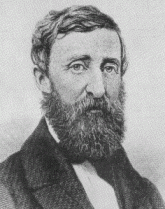 |
Thoreau in Our Time: 46.357.201Midterm Exam Materials and Instructions
DUE VIA EMAIL ON MONDAY, 3/18/2013 |
|
You have three options:
Although you may quote from sources if it is absolutely necessary, the purpose of the exercise is to test your ability to synthesize and convey ideas and information. Consequently, you must summarize the central ideas presented in each source in your own words. Remember that you will be graded according to your ability to write college-level prose. Thus your work should be factually accurate and free of grammatical and logical errors. Please consult the Term Paper Checklist to find and correct common errors before you submit your exam. Minor mistakes will not be held against you, but if your exam indicates that you did not proofread carefully, your grade will be much lower than you might have expected. If you have writing problems, please visit the Writing Center and arrange for a tutor to help you correct your exam before you send it in. Students whose summaries indicate that they put considerable time into reviewing and proofreading can expect to earn the highest grades. Please e-mail your completed exam as one attachment, with all responses/summaries included in one Word.doc (.doc or .docx extension) that is at least four pages. You must use your name in the title of your document (YourName.doc or YourName.docx) and also include it on the first page. The midterm is due via e-mail on Monday, March 18, 2013. If you have any questions, please e-mail me at Susan_Gallagher@uml.edu. Summary Sources: Note: You must be logged in to the library of access some of the background materials. Source: "Resistance to Civil Government" (1849), Thoreau's meditation on the relation between the individual and the government. Background: Robert Gross, "Quiet War with the State: Henry Thoreau and Civil Disobedience," Yale Review 91 (October 2005): 1-17. Concord Jail, Mapping Thoreau Country Source: "Life without Principle," Thoreau's 1854 critique of modern commercial life. Background: Leonard N. Neufeldt, "Henry David Thoreau's Political Economy," New England Quarterly, Vol. 57 Issue 3 (September 1984), 359-383. Nantucket, Mapping Thoreau Country Source: "Slavery in Massachusetts" (1854) - Thoreau's condemnation of the state's complicity in slavery. Background: Mapping Thoreau Country: Framingham (follow links to additional resources) Source: "A Plea for Captain John Brown" (1859) - Thoreau's tribute to John Brown's heroic stand against slavery. Background: Jason P. Matzke, "The John Brown Way: Frederick Douglass and Henry David Thoreau on the Use of Violence, Massachusetts Review, Vol.46 Issue 1 (Spring 2005),62-75. Worcester, Mapping Thoreau Country Source: "Succession of Forest Trees" (1860): "Convince me that you have a seed ... I am prepared to expect wonders." Background: Patrick Chura, "Economic and Environmental Perspectives in the Surveying "Field-Notes" of Henry David Thoreau," Concord Saunterer, Vol. 15, (2007), 37-64. Source: "Wild Apples" (1860) Thoreau's history of the apple explores what is lost with the commercialization of agriculture. Background: Robert A. Gross, "Culture and Cultivation: Agriculture and Society in Thoreau's Concord," The Journal of American History, Vol. 69, No. 1 (June 1982), 42-61. Bedford, Mapping Thoreau Country Source: "Walking" (1862): "In wildness is the preservation of the world." Background: Richard Schneider, "Climate Does Thus React on Man’’ Wildness and Geographic Determinism in Thoreau’s ‘‘Walking,’’ Thoreau's Sense of Place : Essays in American Environmental Writing, edited by Lawrence Buell (Iowa City: University of Iowa Press, 2000), 44-60. (To access e-book, click on Check 360.) Fitchburg, Mapping Thoreau Country Comparison questions: (Answer one; your response must be at least four pages long.) Compare and contrast Thoreau's conclusions in the first two chapters of Walden about the pitfalls involved in getting a living with his observations in "Life without Principle." Compare and contrast Emma Goldman's arguments in favor of anarchy with Thoreau's vision of political progress. Be sure to focus on the two texts most relevant to this question: Goldman's "Anarchism, What It Really Stands For" and Thoreau's "Resistance to Civil Government: A lecture delivered in 1847." Compare and contrast Thoreau's concept of resistance to government with Martin Luther King's doctrine of civil disobedience. Be sure to focus on the two texts most relevant to this question, Thoreau's "Resistance to Civil Government" and King's "Letter from Birmingham Jail." |
|